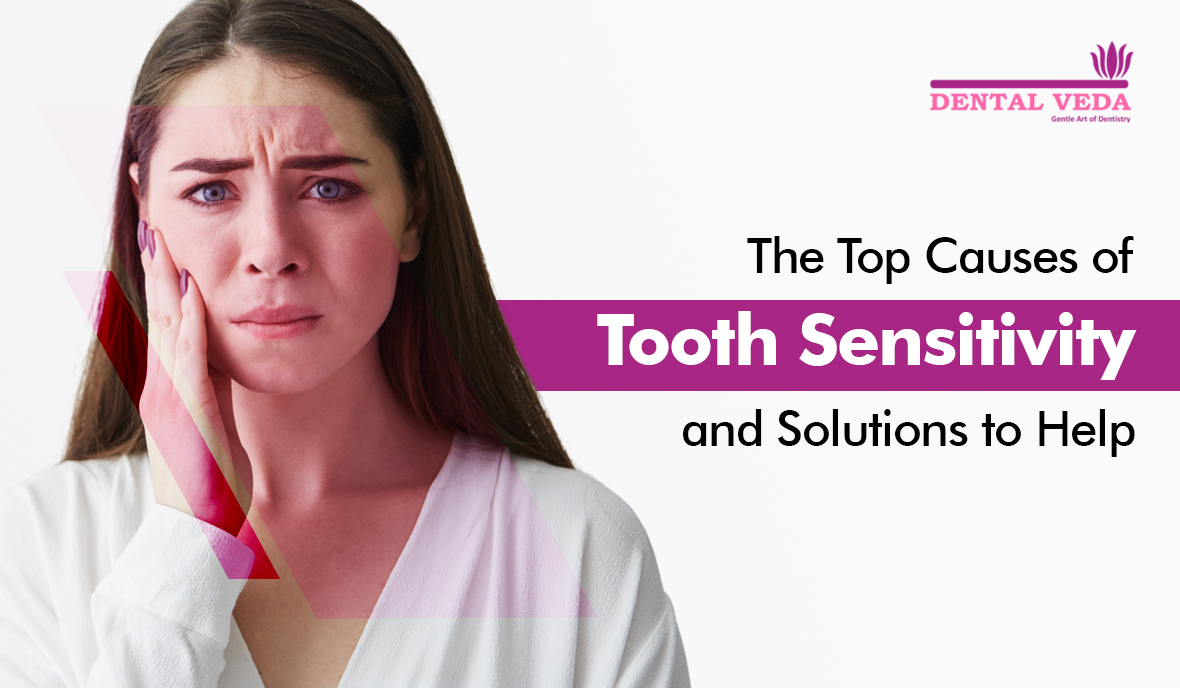Roughly 10% of the population is believed to suffer tooth sensitivity due to various factors, such as worn-out enamel and sensitive roots.
Are you experiencing sharp pain or discomfort when your drink something extremely hot or cold? If so, you may be suffering from tooth sensitivity. This common dental problem affects many people and can be caused by various factors.
In this blog, we will explore the top causes of tooth sensitivity and provide solutions to help alleviate the pain and discomfort associated with this condition. Whether you’re dealing with temporary or chronic tooth sensitivity, we will provide you with the information you need to understand this condition and the steps to manage it effectively.
For chronic tooth sensitivity issues, however, you should always visit the nearest dental specialist.
What Is Tooth Sensitivity?
Tooth sensitivity is a dental condition characterized by discomfort or pain in the teeth when exposed to certain stimuli, such as hot or cold temperatures, sweet or acidic foods, or brushing and flossing.
Tooth sensitivity occurs when the underlying layer of the tooth, called dentin, becomes exposed, which can cause discomfort or pain when the tooth’s nerve is stimulated. Therefore, knowing the right causes can help you prevent them.
Causes of Tooth Sensitivity
Tooth sensitivity can be a result of various causes. These causes include the following:
– Dental Erosion:
Dental erosion is the loss of tooth enamel due to the acids in foods and drinks or due to brushing too hard. Enamel is the protective outer layer of the tooth, and once it is lost, it does not grow back. Acidic foods and drinks, such as citrus fruits, soda, and sports drinks, can cause enamel erosion. Additionally, brushing too hard or with a hard-bristled toothbrush can cause enamel erosion, which can lead to tooth sensitivity.
– Gum Recession:
Gum recession occurs when the gum tissue pulls away from the tooth, exposing the tooth’s root. Periodontal disease, aggressive brushing, or genetics are the major cause of gum recession. Gum recession can lead to tooth sensitivity because the root is not covered by enamel and is, therefore, more sensitive.
– Brushing Too Hard:
Brushing too hard or with a hard-bristled toothbrush can cause enamel erosion and gum recession. Brushing too hard can also cause tooth sensitivity by wearing away the enamel and exposing the dentin.
– Teeth Grinding:
Teeth grinding, or bruxism is a condition in which a person grinds or clenches their teeth, often while sleeping. This can cause enamel erosion, which can lead to tooth sensitivity.
– Cracked Teeth:
Cracked or chipped teeth can expose dentin, leading to tooth sensitivity. Cracks can be caused by a variety of factors, including trauma, tooth decay, and teeth grinding.
– Tooth Decay:
As a result of bacteria producing acids, tooth decay destroys a tooth’s enamel. Once the enamel is dissolved, the dentin is exposed, which can lead to tooth sensitivity.
– Dental Procedures:
Some dental procedures, such as teeth whitening and the placement of fillings, can cause temporary tooth sensitivity. This sensitivity usually goes away on its own within a few days. However, if the sensitivity persists, it may be a sign of a more serious issue, and a dentist should be consulted.
Solutions to Help with Tooth Sensitivity
Depending on the cause, you can easily manage and treat your tooth sensitivity problem. Here are some of the solutions:
– Desensitizing toothpaste:
This toothpaste contains compounds that help to reduce tooth sensitivity. They work by blocking the transmission of pain signals from the tooth surface to the nerve.
– Fluoride treatment:
Fluoride can strengthen tooth enamel and reduce sensitivity. A dentist can apply fluoride in the form of a gel, foam, or varnish to the teeth.
– Dental sealants:
Sealants are thin, plastic coatings applied to the chewing surfaces of molars to protect them from decay and reduce sensitivity.
– Changing toothbrush and brushing technique:
Using a soft-bristled toothbrush and brushing gently in circular motions can help prevent further damage to enamel and gums, reducing sensitivity.
– Night guards for teeth grinding:
Teeth grinding can cause tooth sensitivity by wearing down the enamel. Wearing a custom-made night guard can protect the teeth from grinding during sleep.
– Mouthguards for sports activities:
Sports activities can cause trauma to the teeth, leading to sensitivity. Wearing a mouth guard can protect the teeth from such injuries.
– Dental fillings or crowns for cracked teeth:
A cracked tooth can expose the sensitive dentin or nerves, leading to sensitivity. A dental filling or crown can cover the exposed area, protecting the tooth and reducing sensitivity.
– Root canal treatment for severe cases:
In severe cases of tooth sensitivity caused by damaged or infected pulp, a root canal procedure may be necessary to remove the damaged tissue and restore the tooth.
A dentist can determine the underlying cause of tooth sensitivity and treat it appropriately.
Prevention of Tooth Sensitivity
To prevent tooth sensitivity, it is important to maintain good oral hygiene habits and take steps to protect your teeth from damage. Regular dental check-ups and cleanings can help to identify and address any issues early on before they lead to tooth sensitivity. Additionally, eating a balanced diet and avoiding foods and drinks that are highly acidic can help prevent erosion of the enamel and gum recession.
A soft-bristled toothbrush and gentle brushing technique can also help prevent tooth sensitivity. It is recommended to brush your teeth twice a day for two minutes each time, using circular or back-and-forth motions rather than a scrubbing motion.
Lastly, it is important to seek prompt dental treatment for any dental issues, such as cavities or cracked teeth, to prevent them from leading to tooth sensitivity. By taking these steps, you can maintain healthy teeth and gums and prevent tooth sensitivity.
Conclusion
Tooth sensitivity is a common dental issue that can cause discomfort and pain. However, with proper oral care and prompt treatment, you can alleviate tooth sensitivity and improve your overall oral health. Regular dental check-ups and cleanings are crucial in maintaining good oral health, and seeking prompt dental treatment for any issues are important.
If you’re looking for the best dentist in Gurgaon or a top dental clinic in the area, look no further than Dental Veda, a reputable dental treatment provider. You can enjoy a healthy, pain-free smile for years with the right care and attention from a trusted dental professional.
Frequently Asked Questions
What are the common causes of tooth sensitivity?
The common causes of tooth sensitivity are dental erosion, gum recession, brushing too hard, teeth grinding, cracked teeth, tooth decay, and dental procedures.
How does poor oral hygiene contribute to tooth sensitivity?
Poor oral hygiene can contribute to tooth sensitivity by causing dental decay, gum disease, and plaque buildup. These conditions can lead to enamel erosion and gum recession, exposing the sensitive tooth roots and nerves.
Is tooth sensitivity a symptom of severe dental issues?
Tooth sensitivity can be a symptom of severe dental issues, such as gum disease, tooth decay, or cracked teeth. However, it can also be caused by less severe factors such as brushing too hard or consuming acidic foods and drinks. It is important to consult a dentist to determine the underlying cause of tooth sensitivity and receive appropriate treatment.


